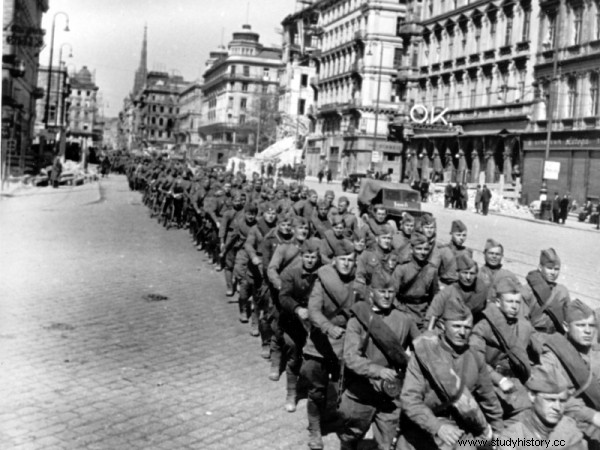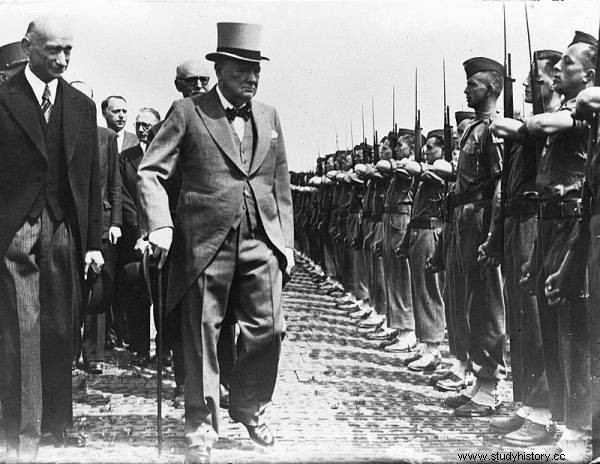1945. The Third Reich fell, but the USSR grew stronger. He could threaten Britain unless she hit first. This is how the Operation Unthinkable plan was born.
The question of whether the Soviet Union could become an enemy of Great Britain began to be considered during the Second World War. The closer to its end, the more nervous the analyzes became. As early as 1944, the USSR was recognized as a potential threat to British security. At least according to the military. British diplomats were vehemently opposed to this. It made no sense at all. Let us remember:Stalin had his agents also in the UK. And if Moscow found out that the British were suspicious of their ally - and were making plans for it - the situation would be dull.
However, before any plans began to emerge, in 1945 was the document The Security of the British Empire . It unequivocally stated that within 10 years the Soviet Union would become a serious threat to Great Britain and its interests. Ah, those politically incorrect military men and their analysts…
What do the Americans say?
Interestingly, Europe was not indicated as a field of potential conflict in the first place, but, inter alia, Near East. It was about business. In this case, the oil fields there, the occupation of which by the Soviet Union would have serious consequences not only for Great Britain. Directions of the USSR's aggression were suggested, such as Iran or even India (via Afghanistan).
In the context of this threat, it was important for the British how their most important allies at the time, the Americans, would approach it. However, one could not really count on these. The US Secretary of State in 1946 stated that: Washington is not more interested in an alliance with Great Britain against the Soviet Union than an alliance with the Soviet Union against Great Britain .

If Moscow found out that the British were suspicious of their ally - and were making plans for it - the situation would be dull.
To make matters worse, Americans were dissatisfied with Winston Churchill's attitude towards their proposal to hold a tripartite conference. Churchill himself was quite radical about the matter. He watched what was happening in Central Europe and how Stalin was doing there. At the beginning of 1945, he was to state that, for example, in the case of Poland, one cannot cheat even if it meant war.
David vs Goliath
A top secret report was issued regarding a potential attack on the USSR. It was only disclosed in 1998. On May 22, 1945, it was handed over to Churchill by General Sir Hastings Ismay. July 1, 1945 was set as the date of the commencement of new hostilities, or rather World War III . But with what the British would hit? And were they sure they had the appropriate forces? The Americans, Poles and ... the remnants of the Wehrmacht would also help them in their frontline operations. It was assumed that the support of the public opinion was high on both sides of the Atlantic. Is it not exaggerated?
In total, it was counted - as already mentioned in the report of July 8, 1945 - on 103 divisions:64 American, 35 British, and 4 Polish . Only 23 armored divisions were to be among them. It was estimated that the assembled troops would face 170 Red Army divisions , including 30 armored ones. However, taking into account the Soviet mobilization possibilities, the total number of divisions of this country grew to as much as 264! There was one more catch. What if the Americans pulled out of Europe?
Of course, the numerical superiority of the Red Army would be overwhelming. It was consoled that the level of discipline and morale in the Soviet units was rather low, while the fatigue of fighting the Germans - high. The technological level of the USSR forces was also lower. Besides, the Soviets were less well trained. But these numbers ... Overall, it was estimated that in Europe alone, the Soviet Union could have as many as 6 million soldiers if necessary. There were also about 600,000 members of the NKVD.
Unthinkable
How was it planned to attack the USSR? There were two possibilities:small-scale or full-scale conflict. The former could turn into the latter anyway. It was predicted that the front could be built on the Szczecin-Piła-Bydgoszcz or Leipzig-Chodziebuż-Poznań line . The goal was to win the armored battle on the Odra-Nysa Łużycka line, which would open the way for further attack. So the main hostilities (again!) Would take place in Poland ...

The Allies, however, had to remember that the Red Army would have somewhere to retreat. And stretching the front lines would be against the coalition.
The Allies, however, had to remember that the Red Army would have somewhere to retreat. And stretching the front lines would be to the disadvantage of the coalition. As analysts emphasized then: there is no border that the Allies would have to cross in order to break the Russian resistance . It was painfully experienced by Napoleon, who entered Moscow, but the Russians did not even think about giving up. The Allies also could not count on the blitzkrieg, which the Germans initially succeeded. The opponent would be too well prepared.
So there was hardly any chance of a quick destruction of the Red Army, even with the support of the United States. How, then, could the Soviet Union be lost? For example, to initiate an armed uprising in its area - although it would rather not make such a difference. It can therefore physically destroy the economy of the USSR to the extent that it is unable to continue the war. Just as? The answer was simple:taking cities. Worse with the implementation of the plan. It would require a considerable effort, as the Germans found out during World War II. Bombing was another option, but distances would be a problem here. Allied bombers would have to fly deeper and deeper into enemy territory, at the risk of simply not coming back.
"Mission:Impossible" failed
The Allies also had to bear in mind that the USSR had something to respond to the attack. There was a fear of a counteroffensive that could have gone in different directions - be it against Denmark, Norway and Sweden, or Greece. Analysts were also concerned about the prospect of a Soviet attack on Turkey, which would cut the West off from the Black Sea. Overall was expected at some point in a Soviet offensive in the Middle East. Besides, let us remember that in countries such as France or Italy, the communist influence after the war was quite strong. The USSR could use it, for example, to carry out sabotage operations. It was also assessed that Stalin could gain an unexpected ally in this war in the form of ... Japan.

The "Unthinkable" plan has finally become a thing of the past.
Everything indicated that despite the best intentions the plan had no chance of success without mobilizing much greater forces which would help to balance the numerical superiority of the Soviet Union. No wonder that in Great Britain it was finally decided to focus more on defending against potential aggression from the USSR . The involvement in the whole Winston Churchill affair ended in a specific way:his Conservative Party lost the elections.
The plan for Operation Unthinkable was finally a thing of the past. It can only be hoped that over the decades the West drew appropriate conclusions from the then assessment of the military and geostrategic situation in order to eliminate its own weaknesses in similar cases.
